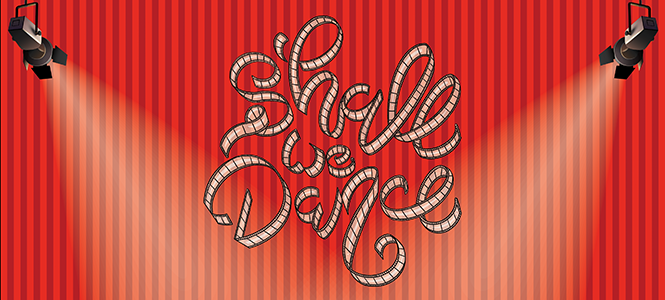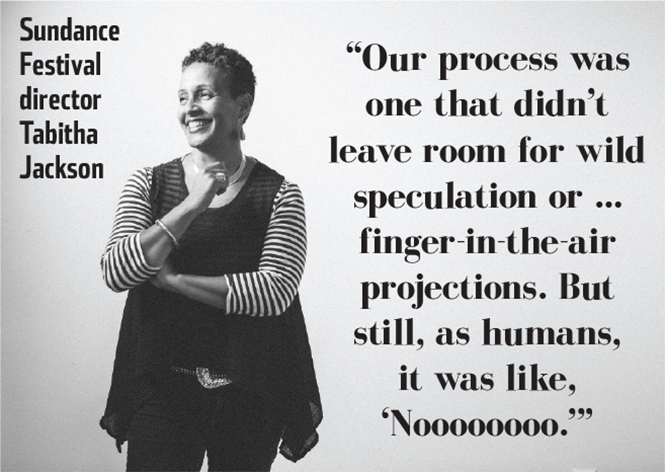
- Derek Carlisle
Two days after the announcement that the 2022 Sundance Film Festival would be cancelling its in-person events and moving to an online-only format, festival director Tabitha Jackson had had a little time to process. The impact on a personal level was clear. "I think that this week," she said, "has been the hardest of my professional career."
The two years of Jackson's tenure at the helm of Sundance have been the strangest and most unpredictable in the festival's history. After 2021's shift to an entirely virtual festival, the plan was in place to make Sundance 2022 a hybrid event, with virtual screenings complementing the traditional live screenings in Park City and Salt Lake City. Even as late as Dec. 23, with the Omicron variant leading to a surge in COVID-19 cases, Sundance was sending out updates to the health and safety policy that still assumed the in-person festival experience—then just a month away—was good to go.
Returning from the holiday break, however—with the announcement of more than 14,000 new COVID cases on Jan. 3, including nearly 1 in 24 Summit County residents testing positive—it was clear that things had changed. "Truthfully, I never thought the in-person would need to go away until the last few days," Jackson says. "What did it was the data, it was as simple as that—the total clarity of the realization that, with the new data, it would be irresponsible to proceed.
Jackson said the new information given to organizers included that the peak of Omicron transmission would fall during the festival. "I completely trusted the process," Jackson said. "Our process was one that didn't leave room for wild speculation or ... finger-in-the-air projections. But still, as humans, it was like, 'Noooooooo.'"
Because of the consequence of this decision, according to Jackson, a lot of people in the Sundance Institute organization had to be part of the process, including the Board of Directors and new Sundance CEO Joana Vicente. "This was a decision of some significance," Jackson said. "It's a big hit, in practical terms. But everybody was on the same page about what we needed to do."
Once the decision was made, however, the process of communicating it presented its own logistical challenges. According to Jackson, every effort was made to reach out to the filmmaking teams ahead of the more public announcement of the move to all-virtual, but it proved complicated to reach everyone, even as rumors of the change began circulating.
"The decision was of such magnitude, that as soon as we had made it, we needed to try to get to the filmmakers before we announced it publicly, but they were pretty much simultaneous," she says. "There was a lot of chatter going on that morning [of Jan. 5], but we had to focus on getting to the film teams. We couldn't really choreograph this."
From a mental energy standpoint, building the virtual platform from scratch for the 2021 festival and having to make this pivot for 2022 were both difficult, Jackson admits, but in different ways and for very different reasons. "It's complicated," she says of whether this year has been harder than 2021.
"We had our hopes up [this year], and we needed to pivot right at the last minute. Last year, the trauma and loss of the pandemic meant that it was a different atmosphere where we were making a decision even to put a festival on," Jackson said. "Now we have vaccines, the stakes are different and the atmosphere is different. We had this moment ... of coming back out onto the streets and getting together, so it feels like something has been taken away again."

- Courtesy Photo
If there's any silver lining, it's that Sundance already did have the experience of the 2021 virtual festival under its belt, and the confidence that it could still be successful, even if in a completely different way. Jackson credits the design of the schedule, which included online "premiere" occasions to allow for that collective moment of experiencing a work for the first time, rather than an exclusively "on-demand" structure.
Additionally, the virtual waiting rooms and live Q&As allowed for interaction both between viewers, and between viewers and filmmakers, for the closest possible approximation of that giddy festival experience.
And with that 2021 experience came the ability to debrief about it and make it even better. "Ever since last year, we've done huge rap sessions to understand what the pain points were for our audience and our artists [of the virtual festival experience]," Jackson says. "So we've been working on that for almost a year now, and we have a smoother, more inclusive experience on the festival platform."
Still, Jackson knows that something is lost in the lack of live screenings, and that the filmmakers are feeling that loss. Jackson herself recalls watching last year's U.S. Documentary Competition winner, Summer of Soul (or, When the Revolution Could Not Be Televised), and feeling the elation of a specific scene involving a duet between gospel legend Mahalia Jackson and young Mavis Staples. "I wanted to be with other people when that happened," she says.
For the moment, she takes comfort in the fact that those same filmmakers gave her the boost of positivity she needed during that crushing week. "In those hardest of times, having to tell filmmakers," Jackson says, "every response I have received has expressed their disappointment, but also a grace, and acknowledgement of the bigger picture. That's been so moving to me. Our filmmakers desperately wanted to be here, but they understood."